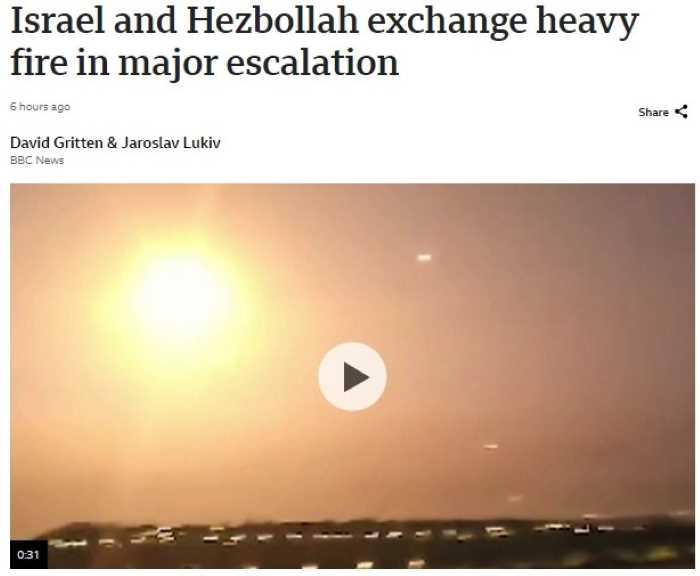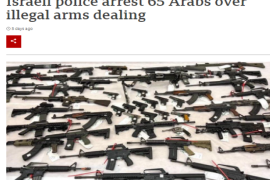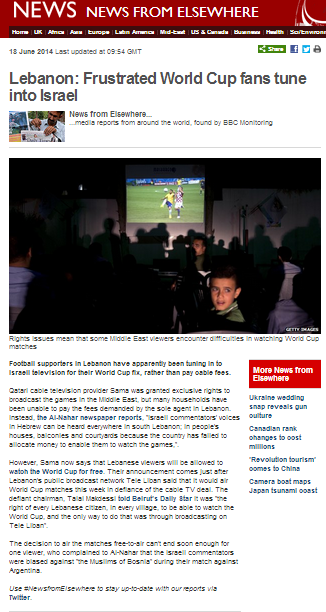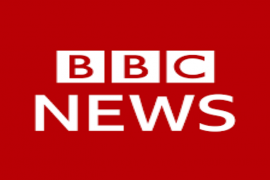Early on the morning of August 25th the Israeli air force carried out a series of strikes on Hizballah rocket launchers in southern Lebanon. Later, the Iran-backed terrorist organisation attacked northern Israel with over 200 rockets and around 20 drones.
The BBC News website published four separate items of content relating to that story on August 25th:
- “Explosions over Israel as rockets fired from across Lebanon border” – filmed report, uncredited, no commentary.
- “Israel and Hezbollah exchange heavy fire in major escalation” – originally titled “Israel strikes Hezbollah targets in Lebanon” and credited to Jaroslav Lukiv. Amended throughout the day and now credited to Jaroslav Lukiv and David Gritten.
- Live Page – “Edited by Jack Burgess and Andrew Humphrey, with reporting from Alice Cuddy and Jon Donnison in Jerusalem, and Hugo Bachega in Lebanon”.
- “Israel and Hezbollah say they don’t want war – but they are both ready for it” – Jon Donnison
In part one of this post we discussed the framing of the background and context to that story in those BBC reports. In this post we will focus on the BBC’s portrayal of the events themselves.
All the four reports promote Hizballah claims concerning supposed attacks on “military sites” in northern Israel.[emphasis added]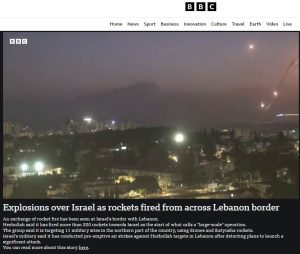
Filmed: (synopsis)
“The group said it is targeting 11 military sites in the northern part of the country, using drones and Katyusha rockets.”
Lukiv & Gritten:
“Not long after the Israeli strikes, Hezbollah said it had targeted and hit 11 Israeli military facilities in Israel and the occupied Golan Heights with more than 320 Katyusha rockets.”
Live Page:
“The Lebanon-based group said it targeted an identified “special military target as well as Israel’s Iron Dome platforms and other sites but that the full response would take some time”.
It warns Israel a number of “enemy sites and barracks” will be targeted, adding that the group will “stand strongly against Zionist transgression or aggression” if civilians are harmed.” [05:01]
“In a statement, the Iranian-backed Lebanese group says it targeted 11 military sites in northern Israel with hundreds of Katyusha rockets.” [Alice Cuddy 05:29]
“The group [Hizballah] says it is targeting 11 military sites in the northern part of the country, using drones and Katyusha rockets.” [06:35]
“Hezbollah says it fired more than 320 rockets towards Israel targeting 11 military sites in the northern part of the country.” [07:45]
“Later, Hezbollah confirmed it had started “phase one” of an extensive attack on Israel, firing 320 Katyusha rockets and drones towards Israel and targeting 11 military sites” [08:47]
“Hezbollah, which has spent months mapping and gathering intelligence on targets inside Israel, says it hit 11 Israeli bases in a wave of Katyusha rocket launches.” [Frank Gardner 10:00]
“Hezbollah later said it had started “phase one” of an extensive attack on Israel, firing 320 Katyusha rockets and drones and targeting 11 military sites – today’s operations are now complete, according to an update” [11:34]
“Hezbollah says it targeted 11 military bases and barracks. That is significant. Even though it was a large -scale attack it did not target key infrastructure or a major city. In that sense, Hezbollah has kept within what are regarded as the rules of engagement in this tit-for-tat conflict – striking military targets, not civilian ones.” [Orla Guerin 12:13]
Donnison: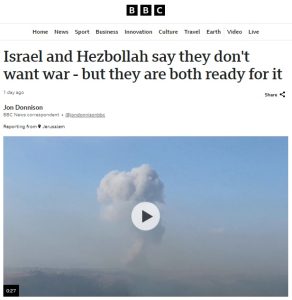
“In the end Hezbollah said it had fired more than 300 rockets and missiles targeting military facilities in northern Israel, where air raid sirens have been sounding.”
Clearly BBC journalists were more than happy to uncritically repeat Hizballah’s statements but less eager to fact-check its claims. As reported by the Israeli media, no military facilities were hit by Hizballah’s attacks and contrary to Guerin’s portrayal, the only structures damaged were civilian homes – including in the “major city” of Acco – and a poultry farm.
“Hezbollah said it launched more than 320 rockets at Israel in the attack, along with several drones. According to the IDF, some 210 rockets and 20 drones were launched.
The rockets were aimed at northern Israel, while the drones are believed by the IDF to have been heading for central Israel.
No IDF bases were damaged in the attack, and none of the Hezbollah drones impacted targets in central Israel, according to the military.
Most of the projectiles struck open areas, and many were intercepted by air defense.
Shrapnel from an interception hit a home in the coastal city of Acre, lightly wounding a civilian, and another rocket struck the northern community of Manot, causing damage.”
Later on August 25th, Nasrallah gave a speech which was portrayed in an updated version of Lukiv and Gritten’s report as follows: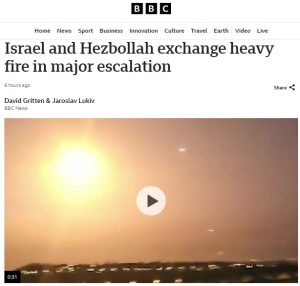
“Hezbollah leader Hassan Nasrallah said in a televised address on Sunday evening that the group had targeted a military intelligence base about 110km (68 miles) into Israeli territory, which was only 1.5km (0.9 miles) away from Tel Aviv.
He said Hezbollah had been able to carry out its attack as planned, and all drones had been launched successfully, entering Israeli airspace, according to a Reuters translation.”
The Live Page told BBC audiences that:
“Nasrallah goes on to say that Hezbollah targeted a military intelligence base 110km (68 miles) into Israeli territory, which was 1.5km (0.9 miles) away from Tel Aviv.” [16:31]
“Hezbollah leader Hassan Nasrallah spoke a little while ago on television. He says his group targeted a military base near Tel Aviv, Israel, in this morning’s rocket and drone attack” [18:46]
Once again, BBC journalists obviously did not bother to fact-check Nasrallah’s claims concerning that supposed targeting of the Glilot military base. Had they done so, they would know that no such attack took place.
As we see, the four items of BBC News website content relating to this story promoted problematic and partial framing of its background as well as the false claims of a terrorist organisation.
Rather than reporting this story in an accurate and impartial manner as BBC editorial guidelines require, these four items simply ensure that disinformation deliberately put out by Hizballah will remain online as “permanent public record”, thereby misleading members of the public both in the present and the future.
Related Articles:
BBC NEWS WEBSITE FRAMING OF AUGUST 25 HIZBALLAH ATTACKS – PART ONE

